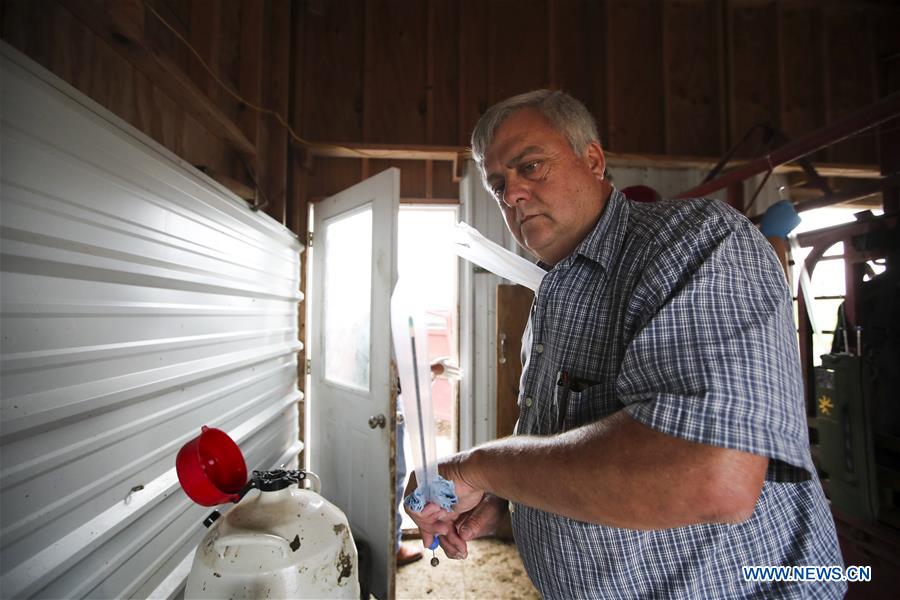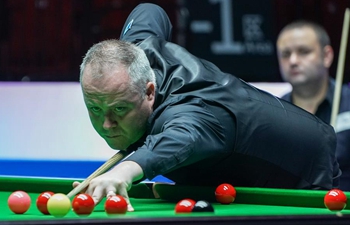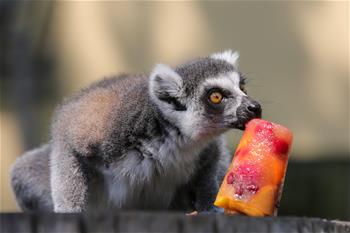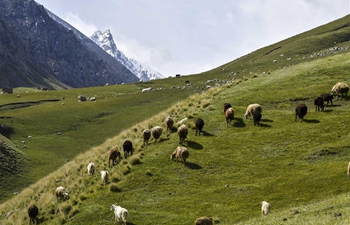
Bill Pellett's long-time business partner Phil Ham prepares a syringe for his son Cody Ham during artificial insemination procedures on Bill Pellett's farm in Atlantic, Iowa, the United States, on June 20, 2019. Bill Pellett, a fifth-generation farmer in Atlantic, a small city in the U.S. Midwestern state of Iowa, has found a cost-effective way to raise better calves each year without purchasing new bulls -- artificial insemination (AI). (Xinhua/Wang Ying)
by Xinhua writers Yang Shilong, Chang Yuan
ATLANTIC, the United States, June 29 (Xinhua) -- Bill Pellett, a fifth-generation farmer in Atlantic, a small city in the U.S. Midwestern state of Iowa, has found a cost-effective way to raise better calves each year without purchasing new bulls -- artificial insemination (AI).
The artificial breeding allows him to have a "much better genetics" in the herd as he can select semen from a bull proven for such things as calving ease, growth, maternal traits, and carcass traits, Pellett told Xinhua in a recent interview at his 6,000-acre family farm where he and his sons feed nearly 2,000 head of cattle while producing corn and soybeans.
"We look at basically things like these to create an animal that is superior to what we could afford to buy as a bull," said the 71-year-old farmer.
The AI sires tend to be of a lot higher quality, according to Pellett's long-time business partner Phil Ham, 60, who raises a herd of over 500 Black Angus cattle at his family farm -- Sleepy Creek Farms in Forsyth, Georgia.
The bull used for AI-ing at Bill's is "at the top" of the Angus breed as far as tenderness and quality of the meat is concerned, "perfect for a steak or fine in a hot pot meal," said Ham.
"We have a better handle on tenderness, size of the rib eye, the marbling, the fat thickness ...there're a lot of varieties of traits that we can be very selective about (with AI)," said Pellett.
In addition to better quality beef, the AI allows cattle farmers to get higher yields with fewer inputs.
"By artificial inseminating, I can improve my cow herd at a much greater rate, and you know it's a little more expensive in the short term, but in the long term, it would make a big difference," Pellett said.
Average yearling beef bulls are sold at 3,500-5,000 U.S. dollars, and they each can breed about 25-35 cows per year, noted Phil.
"They cost about 500 dollars per year to feed and maintain. A straw of semen to breed one cow costs from 12 to 25 dollars," he said.
Plus a few medications that make cows become in heat at the same time, Pellett added, it may cost "up to 35-40 U.S. dollars per cow to improve your genetics drastically."
With the AI, the farmers can also achieve a more uniform calf crop by having a shorter calving season.
During the program, the cows are "synchronized," that is, to make them ovulate at the same time by giving them a combination of prostaglandin and other estrous-synch products, as Pellett said.
With or without visible signs of heat, the cows can all be artificially inseminated on the same day,
Phil and his son Cody Ham came to help Pellett inseminate 18 heifers and 72 cows last Wednesday and Thursday. It has been part of their cooperation for the last five years.
About 25 cattle farms including the Ham's in middle Georgia send selected 8-12 months cattle to Pellett's feedlot each Spring. And Pellett's would keep them for another six months to have their weight doubled before shipping them to a packing company in the neighboring state of Nebraska.
"We get a conception rate of anywhere from 60 to 75 percent, depending on the weather conditions, the condition of the cows," Pellett said, adding that they will need a cleanup bull to catch late breeders that do not settle by AI.
But AI is not an easy technique to learn and it takes more time and management than natural breeding, Phil said. "Main challenges are keeping the cows in good enough body condition to have a high conception rate."
Cody attended AI school at Mississippi State University after he was trained as his father's assistant for years.
"We buy the semen in bulk and store it in an insulated aluminum tank with liquid nitrogen in it. It is -273 degrees Fahrenheit (-169 degrees Celsius). We picked the semen up in Missouri," Phil said.











